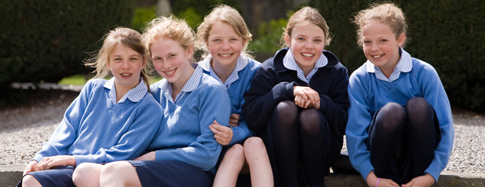Education and schooling

Foto © Badminton School
England, Scotland, Wales and Northern Ireland do all have independent systems of education that are very closely related, but whose contents and structures are defined by local authorities.
In England, Scotland, Wales and Northern Ireland development and education fall into four stages:
The first stage is the stage of early childhood, in which the children are between three and four years old. At this point they are enrolled in the so-called nursery schools.
The second stage relates to the age group between four and eleven years. At this stage the children enjoy the so-called primary education.
At the third stage the students are between eleven and eighteen years old. This stage, the so-called secondary education, is a determining facor for your child and hence the most important one for our school consultancy. Thus, we need to dwell on it below.
Finally the fourth phase, the so-called tertiary education, is the phase of further education, which is attached to schooling, in other words the postsecondary education resp. university education.
Except for that it is necessary to distinguish state-funded and private schools in the British school system. The latter are also called independent or public schools. But as “public” can also mean “state” or “common” in English language, this term can be quite misleading in the first instance for people from abroad.
It has its origins in the history of the late Middle Ages. Back then education was very expensive, so poor people could not afford schooling. Only aristocrats and wealthy burgesses were able and allowed to send their children to school. At that time this second group of people was called the “publicised” people. By the way, famous Eton College is thought to be the oldest public school, which was founded in the year 1440.
In England, Wales and Northern Ireland the change from primary to secondary school takes place at the age of eleven, whereas in Scotland it happens at the age of twelve. At that point the students, together with their parents, can choose from a change to a grammar, comprehensive or even public school. Most likely grammar schools correspond to German Gymnasien, whereas comprehensive schools are most likely comparable to German Gesamtschulen.
Compulsary school days come to an end with the end of the eleventh school year where students usually reach their sixteenth year. Further education between the sixteenth and eighteenth year of age is called the Sixth Form. In this phase the students study three to five subjects for their A levels. After their successful graduation which corresponds to the German Abitur, the alumni may eventually attend university.
All schools that collaborate with us are independent resp. public schools, therefore private schools with affiliated boarding homes. They enjoy an excellent reputation and provide an outstanding schooling as well as education of your children.
Due to the fact, that British public schools have to do without state aid and have to face intense competition in the education sector, they constantly offer impartation, education and value orientation on a high level, which can be found few only in a few schools in continental Europe.






